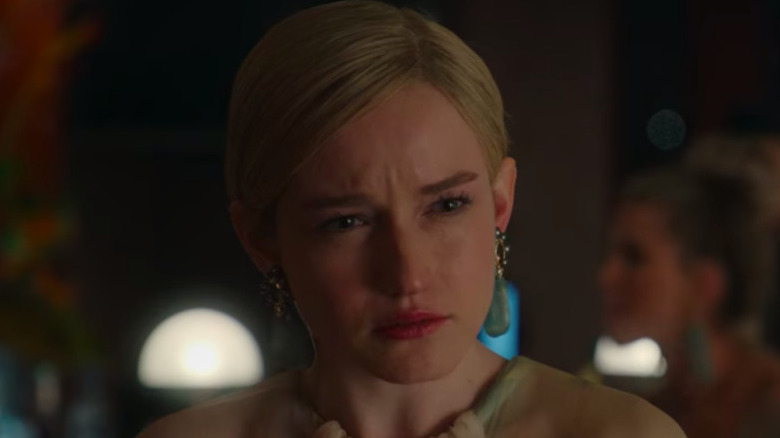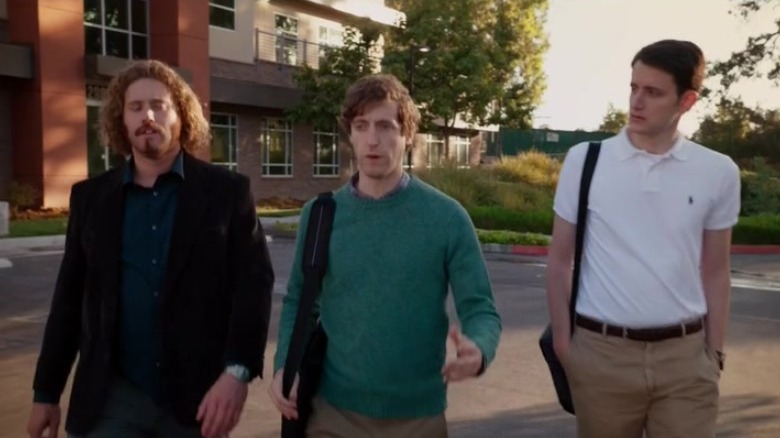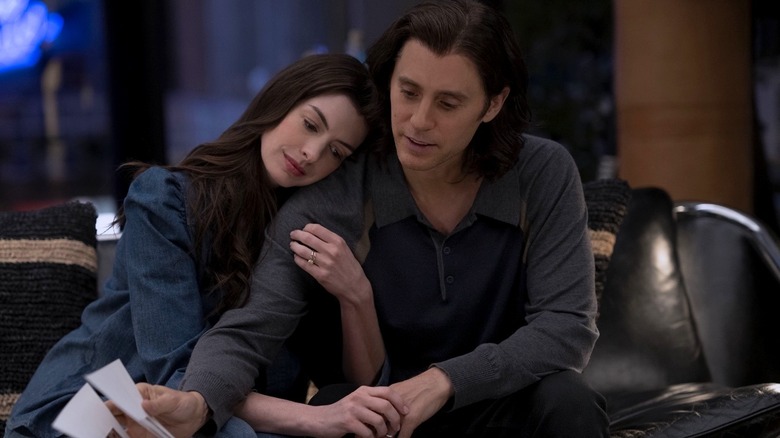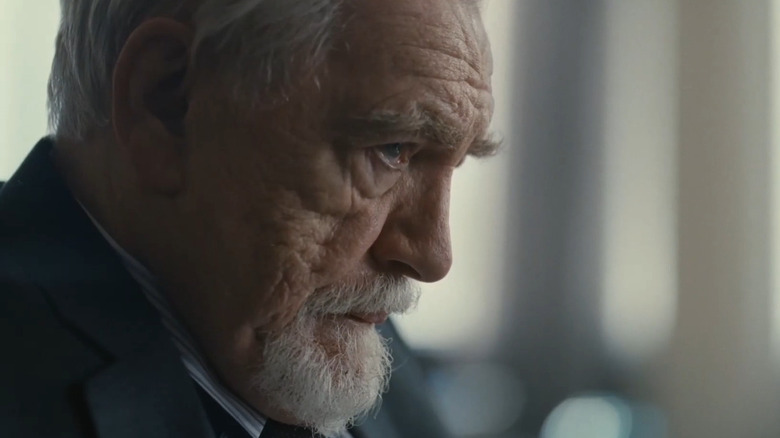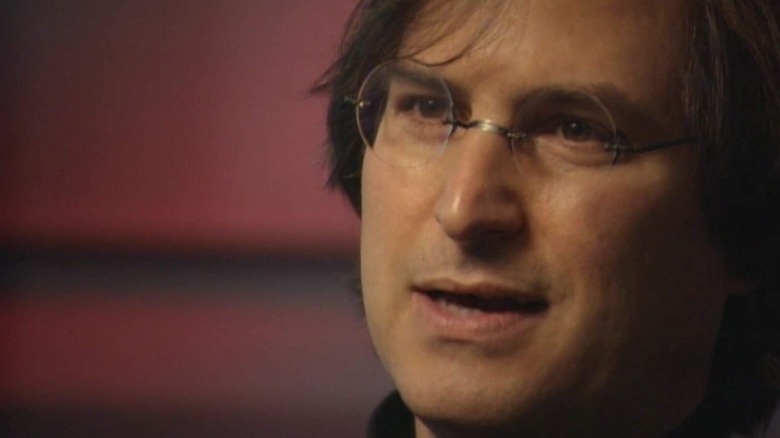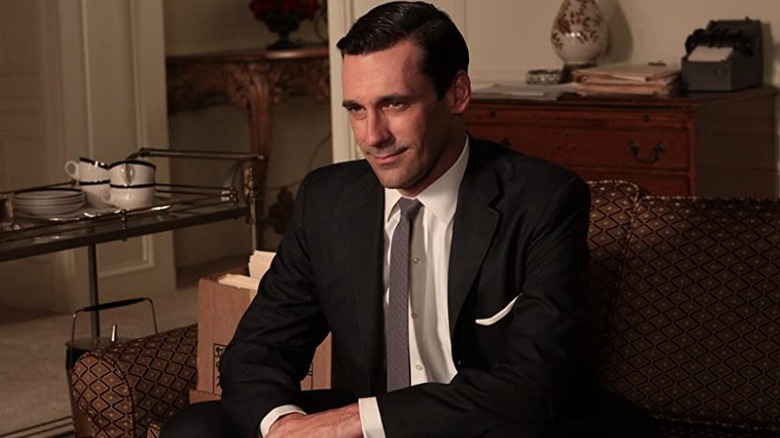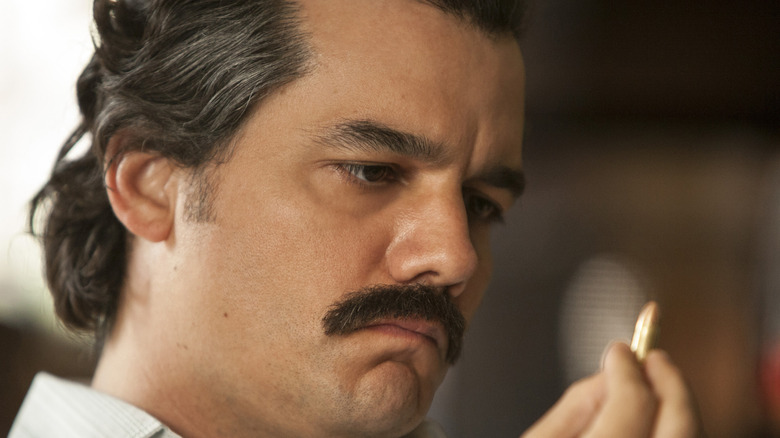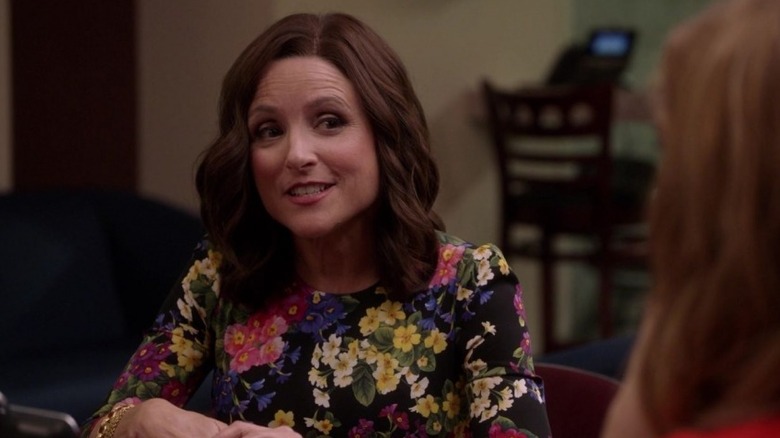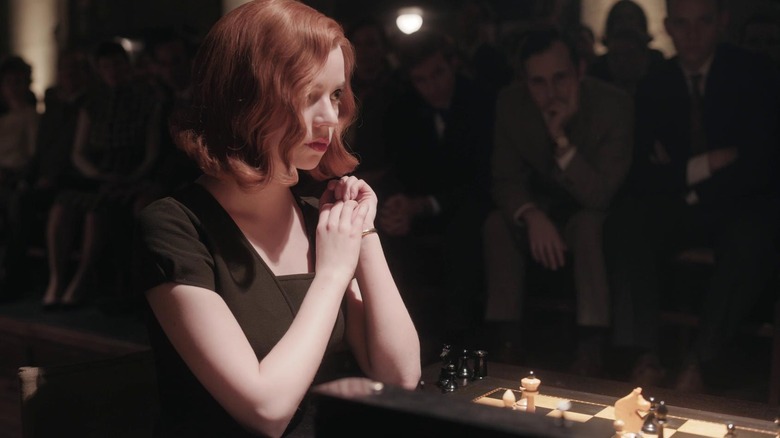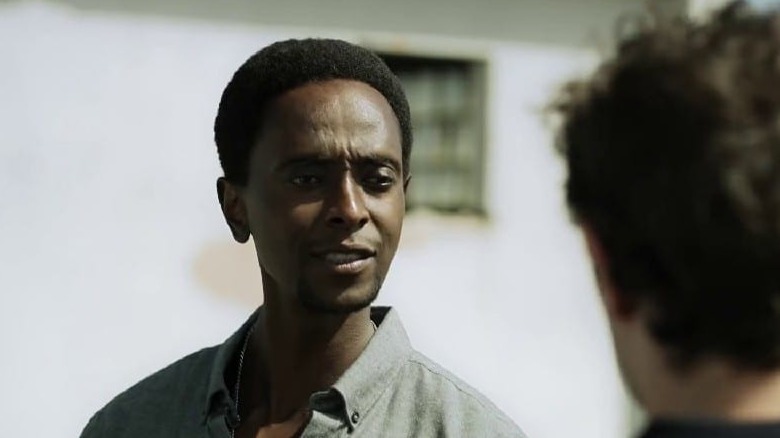TV Shows To Watch If You Love The Dropout
Hulu crafted the eerily dramatic "The Dropout" based on the true story of the rise and fall of Elizabeth Holmes and her company, Theranos. The miniseries is heavy on themes of the corruptible nature of power and explores how human beings can be beholden to overambition, leading to the show's impressive critical acclaim. Nevertheless, as fans approach the final episode, cringing through every stomach-churning decision made by Holmes, two questions probably arise: Is Amanda Seyfried going to win an Emmy for this, and where else can I find a show like this?
That's where we come in. Considering that Forbes reported "The Dropout" once occupied the Nielsen's top 10 streamed programs, it's safe to assume there are a lot of fans clamoring for a show that explores similar themes. "The Dropout" covers a lot of ground in just eight episodes, offering perspective on the pursuit of the American dream, blind ambition leading to moral bankruptcy, and tech billionaires' obsession with disruption. If you're interested in other series that mirror "The Dropout" and want to know exactly why they are similar, here are the TV shows to check out.
Inventing Anna
In "The Dropout," Elizabeth Holmes is confronted by her employees when she subjects a group of terminally ill cancer patients to a clinical trial with a prototype that isn't quite ready, to which she coldly responds that it's all part of the plan. Holmes applies the mantra of "fake it 'til you make it" to how she ran her business, regardless of how everyone else was affected. She was willing to weave lies and fabricate stories for the purpose of coming off as someone who knew what she was talking about. This aspect of her personality is highly reminiscent of Anna Sorokin from "Inventing Anna."
In "Inventing Anna," Julia Garner plays a purported German heiress who scams and lies her way up the elite social scene in New York, even fooling reputable banks and journalists along the way. The miniseries showcases Anna's rise and fall. What is so fascinating about both "Inventing Anna" and "The Dropout" is that they seemingly occur in real life at around the same time on different coasts of the United States, which goes to show that ambition without principles leads to disaster everywhere.
Super Pumped: The Battle for Uber
Elizabeth Holmes was never shy about bending the truth when the science of her company threatened to slow her down. In one episode, her company presents a Swiss medical company with the results of their blood testing machine. When it fails to work at the last minute, does Holmes concede the hiccup and get back to testing? Of course not. She lies and pressures her employees to present deceitful results. This is similar to the often unforgivable actions of Uber CEO Travis Kalanick, brilliantly played by Joseph Gordon-Levitt, in Showtime's "Super Pumped: The Battle for Uber."
In the show, Kalanick repeatedly breaks other companies' business terms and even tricks the city council to get what he wants and believes is right — regardless of whether he's actually right or just guided by ego. What makes the miniseries so similar to "The Dropout," however, is how the founders of these companies are much more interested in being perceived as being successful by their peers and heroes than in pursuing their stated mission of making the world a better place. It's also worth adding that, similar to "The Dropout," "Super Pumped: The Battle for Uber" also boasts an all-star cast, one that even includes Mark Cuban from "Shark Tank" playing himself.
Silicon Valley
One thing about "The Dropout" that stands out to even the most casual viewers is the depiction of the inner workings of Silicon Valley, the tech headquarters of the globe. Elizabeth Holmes went from having a great idea to getting substantial funding through speculation. This lack of oversight can help create the world's greatest technological advancements — or disasters like Theranos. As showcased in "The Dropout," the direction these companies ultimately take is decided by the founders.
Another show that also explores the nature of the tech capital is aptly titled "Silicon Valley", the Emmy-winning HBO comedy series. It follows four founders whose friendship blossoms through their mutual, albeit often adversarial, respect for each other's professional ability. The show depicts almost every aspect of the ridiculous world of Silicon Valley, and much of the humor is derived from the fact that the investors, who are often thought of as the grown-ups in the room, are just as conceited, if not more so, than the egotistic founders themselves. The tone of "Silicon Valley" is definitely more satirical and comedic, but it still manages to live up to its contemporary dramatic series on our list.
WeCrashed
What "The Dropout" portrayed well was Holmes' habit of jettisoning lovers, mentors, and co-workers throughout the show. Refinery29 once questioned whether the real-life Elizabeth Holmes showed signs of narcissism, noting that "people who have narcissistic personality disorder (NPD) tend to act with grandiosity and self-importance, with a fixation on unlimited success, control, brilliance, or beauty." Certainly, that checks with Holmes' behavior throughout the entire series. She seems obsessed with being included in the pantheon of Gates and Jobs; nothing or no one else seemed to matter to her.
At the start of "WeCrashed," Jared Leto and Anne Hathaway play the two masterminds of a company that offers co-working spaces. However, as time goes by, it's clear that the intent of the company is solely to feed the insatiable narcissism of Adam Neumann, who convinces workers to come to join him in his company for lower pay with the promise of equity later on. The company starts to operate more and more like a cult, with Neumann's inexcusable ideas and behavior making the workplace toxic and overbearing. The miniseries is a character study of a narcissist and what it feels like to work for such a person, just like in "The Dropout."
Succession
One thing you will notice right away in "The Dropout" is that Holmes is not one to be trusted. At every opportunity, she will choose what benefits her immediate needs, however petulant they may be. Holmes does not care about the potential casualties or what enemies she might create along the way as long as she gets what she wants. She is willing to hurt the people closest to her and even manufacture entirely new personas, just like Holmes does towards the end of the series when she decides to change her nickname. It's clear that Holmes only cares about winning.
Consider Logan Roy, the patriarch, chairman, and CEO of a media company in the award-winning HBO drama "Succession." The basic plot of "Succession" is that Logan is aging out of his company, and he's trying to figure out which of his children can best succeed him. However, he constantly encourages infighting, destroying his children's confidence in his endless bids to retain power over the company he founded. In doing so, he creates quite possibly the worst working environment on this entire list.
Logan Roy holds two contradictory beliefs. The first is that if one of his children truly possessed the ability to take over a company, they would destroy him. In opposition is his belief that if his children truly loved him, they would not try to destroy him. And he's willing to create whatever chaos is required to continue living in this state. It's well worth the watch.
Triumph of the Nerds
In the first episode of "The Dropout," Elizabeth Holmes justifies her decision to drop out by naming several tech moguls who did the same, listing Mark Zuckerberg, Steve Jobs, and Bill Gates. What these titans of industry managed to achieve despite dropping out of college gives Holmes the confidence that she too can drop out and still become as wealthy and successful as she wants to be. Holmes is so fascinated by these individuals that she dedicates her entire personality and career to emulating them.
"Triumph of the Nerds" is a documentary that follows some of the most important figures that brought the world of personal computing to the masses. The series looks at pioneers who are household names, like the Steves Jobs of Apple and Bill Gates of Microsoft, to lesser-known innovators like Ed Roberts. This three-episode docuseries lifts the hood on how impressive these men were and how much they changed the world. It's no wonder that Holmes wants so desperately to pretend she is the reincarnation of them. It's a fascinating watch for audience members curious about what made these individuals so great that even someone as narcissistic as Holmes felt they were worth looking up to.
Mad Men
One of the most puzzling things about Elizabeth Holmes is that when she started her ascension towards fame and fortune, she began crafting a fake persona with a deeper voice and only wore black turtlenecks reminiscent of Steve Jobs in public appearances. The reason for this behavior can, at best, be diagnosed by a mental health care professional and, at worst, be speculated about by people making bad guesses. However, what's clear is that "The Dropout" revolves around a character who is willing to change his entire identity to climb the corporate ladder.
Don Draper in "Mad Men" does the same thing when he steals another man's identity and starts a life in New York as an advertising agency executive during the 1960s. The show is a slow burner, but the audience never gets bored as they watch Don dig himself deeper into his self-afflicted misery where he treats everyone around him as dispensable while creating iconic ad campaigns. It's a must-watch classic, especially if you loved "The Dropout."
Narcos
The beginning of the end of Elizabeth Holmes' company in "The Dropout" arrives when her ambitions finally overtake her principles, and she stops officially caring about ethics or being careful. Her ego starts writing checks she can't cash when she starts making claims to the press and investors that people in her company know are not feasible in the short term. Her solution to their dissent is reacting with hostility instead of listening to her capable employees. This eventually leads her to become isolated and vulnerable to multiple lawsuits for all the lies she has told.
Although "Narcos" follows a more violent and infamous criminal, Pablo Escobar (Wagner Moura), he also starts as a small figure with manageable organization and a group of trusted subordinates. However, as his ego grows, he lets himself become the primary target of the authorities. A series of poor choices follow, and while he can often pull himself out of trouble, his pride is ultimately too big, much like Elizabeth Holmes. It's also worth bearing in mind that well-known figures like Holmes, Escobar and many others often have a life story even more fascinating than the headlines that ring across pop culture. Just for that, "Narcos" is a must-watch.
Billions
Things in "The Dropout" really start heating up in Episode 7, "Heroes," when The Wall Street Journal starts to look closer at Theranos. John Carreyrou's (Ebon Moss-Bachrach) investigation starts building tension, making everyone at Theranos question whether the decisions they've made up to that point were worth it, while a mixture of pride and regret starts making people act out of character. It's where the show, and especially the acting, truly shines and captures the audience's undivided attention.
"Billions" is that cat-and-mouse game over and over again. Chuck Rhoades (Paul Giamatti), a New York district attorney, constantly attempts to apprehend Bobby Axelrod (Damian Lewis), a hedge fund manager who habitually breaks the law in amusing ways. In a sense, it channels that taut episode of "The Dropout" but manages to keep the anxiety level high for several seasons. If the later stages of "The Dropout" was your favorite part of the show, be sure to also check out "Billions."
Wu-Tang: An American Saga
The first half of Elizabeth Holmes' story truly encapsulated the American dream. A university student feels disillusioned by the education system and questions whether she even has to fully subscribe to it to live her dream of being an innovator. She then drops out of school and relocates to a city where she can realize her wildest dreams. In a short period, she's well respected in her field and has amassed considerable wealth for herself. This is what ambitious, hard-working, and honest people are promised in America. Remember that, for a minute, Holmes was on the cover of just about every significant financial magazine.
In "Wu-Tang: An American Saga," we follow a dozen Black men from New York who use their artistic abilities to escape poverty and create an iconic rap group whose logo remains instantly recognizable today. This Hulu series depicts the time when they're still starting out, documenting their doubts, difficulties in learning how to work together, and slow rise to the top of the music world. These aspects make "Wu-Tang: An American Saga" is well worth watching.
Veep
In "The Dropout," Holmes fabricates test results while trying to convince everyone around her that this is all part of a grand plan. If they can just get the credibility and accolades first, then later they can focus on the actual testing machine. At least, that's what she says. It's unclear whether she also buys into her own lies, but it is clear that she is always optimistic that everything she is doing is in service to her future self and that she will later reap the benefits of the empire she is building.
That aspect of Holmes resembles Selina Meyer's (Julia Louis-Dreyfus) bid for the presidency and her willingness to lie, cheat, and bend the law to achieve her goal in HBO's critically acclaimed comedy "Veep." As the show goes on, one gag after another, it's clear that not only is Selina not fit for the office, she's not even fit to maintain personal relationships — not even one with her own daughter. Her moral bankruptcy eventually leads her to achieve a hollow version of her dream. If you find Elizabeth Homes' moral ambiguity intriguing, you will likely enjoy "Veep."
The Queen's Gambit
"The Dropout" follows a highly motivated young woman whose ambition is threatened by her proclivity to lie compulsively. If Holmes were willing or able to accept how much time her product needed to develop, then maybe she would still be in business, albeit less wealthy and less famous than she was in her prime. Her downfall is orchestrated by habits she seems unable to control and the fact that she forgets why she even started her company in the first place — to help people.
In "The Queen's Gambit," Beth (Anya Taylor-Joy) is a chess prodigy whose ascension to the top of the chess world is threatened by her addiction struggles. "The Queen's Gambit" and "The Dropout" evoke that same feeling in audiences, where we try to root for a character even when they're holding themselves back. After all, nothing quite matches the high of a triumphant return after a devestating fall. Watch "The Queen's Gambit" to experience an extremely satisfying redemption arc.
StartUp
One thing that "The Dropout" does exceptionally well is to explore the dirty side of the tech world and how unethical these low-regulated industries can get. After all, the major problem with Theranos is that nobody is verifying whether the claims Holmes makes are true. Another problem is that there are no real licenses she had to obtain, nor does she deal with government authorities in any meaningful way. All of this occurs despite Theranos being a medicine-based company.
"StartUp" follows a group of criminals who take advantage of these same factors and set up a cryptocurrency sweatshop to launder illegal money. The FBI is soon onto them, and they start trying to thwart their every move. The show has an impressive cast, led by the often underappreciated Edi Gathegi as Ronald. It's a very fast-paced and fun show, but it also depicts just how crime-infested the tech world can get.
Inside Bill's Brain: Decoding Bill Gates
In "The Dropout," Holmes compares herself to a tech entrepreneur in front of the press. She realizes the importance of strong public relations. She states right away that she sees herself in the same category as Bill Gates and Steve Jobs. As such, it is fascinating to see a documentary on how Gates handles himself and whether it is comparable or different to Holmes in any manner.
Bill Gates has famously taken a career pivot into focusing on philanthropy, with an emphasis on health issues and food security. The three-episode Netflix docuseries "Inside Bill's Brain: Decoding Bill Gates" focuses on his life story and his current worldview, and it's a fascinating profile of one of the most famous and wealthiest men in the world. Especially now, at a time when the billionaires are seemingly the only celebrities that people don't have instant access to. "Inside Bill's Brain: Decoding Bill Gates" is an interesting watch for anyone curious about the mindset Elizabeth Holmes hoped to emulate.

